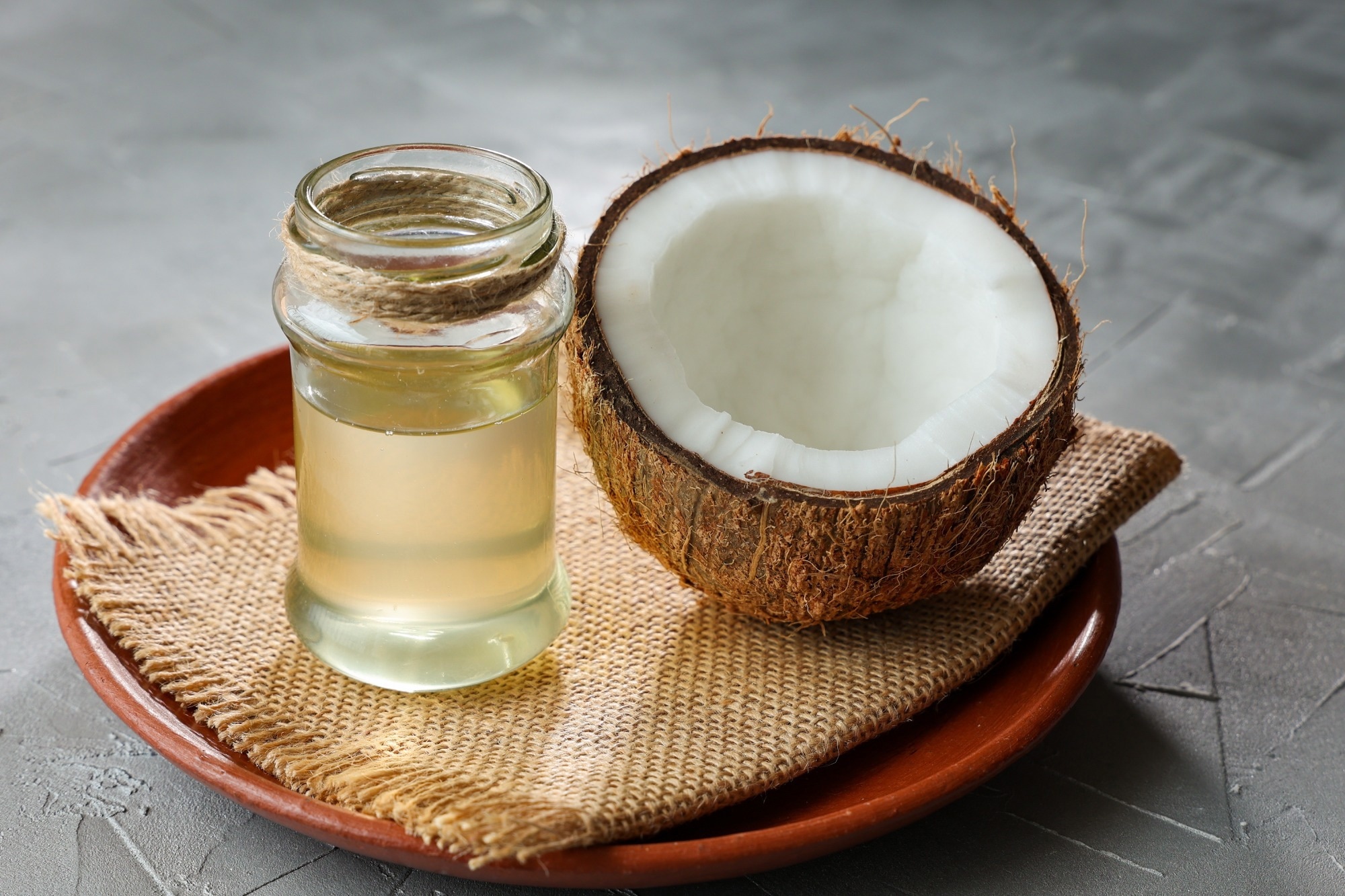A review reveals how the bioactive compounds in virgin coconut oil could weaken cancer cells and may help shield the body from chemotherapy’s harsh side effects, offering hope for future natural therapy treatment options.
 Study: Virgin Coconut Oil and Its Lauric Acid, Between Anticancer Activity and Modulation of Chemotherapy Toxicity: A Review. Image credit: Santhosh Varghese/Shutterstock.com
Study: Virgin Coconut Oil and Its Lauric Acid, Between Anticancer Activity and Modulation of Chemotherapy Toxicity: A Review. Image credit: Santhosh Varghese/Shutterstock.com
Existing research highlights the anticancer effect and mechanism of virgin coconut oil (VCO) and lauric acid (LA). It also points to VCO's potential to combat the harmful side effects of chemotherapy. A recent Journal of Xenobiotics study reviewed the existing literature on the role of VCO and its resident bioactive compound, LA, in cancer and chemotherapy toxicity.
VCO, LA, and general health benefits
VCO is rich in bioactive compounds such as saturated fatty acids (SFAs), phospholipids, flavonoids, phenolic acids, and polyphenols. These components provide anti-inflammatory, antioxidant, antimicrobial, and anticholesterolemic benefits, although some findings on lipids and cholesterol effects remain controversial across different studies and populations. VCO has a significantly higher phenolic content than regular coconut oil, enhancing its antioxidant properties and health benefits.
LA is a significant component of VCO and is the most prevalent medium-chain fatty acid (MCFA) in VCO. It enhances the effectiveness of anticancer drugs by showing preferential cytotoxicity toward cancer cells in some studies, although consistent selectivity over normal cells has not been firmly established. LA inhibits cancer cell growth, promotes apoptosis, and inhibits cancer-related signaling pathways.
Anticancer Effects of VCO and LA
VCO has shown promise in treating various cancers, including lung, breast, colon, oral, and liver. Existing research highlights its ability to inhibit the growth of cancer cells, particularly in oral and liver cancers. A VCO-based nanoemulsion enhanced the effectiveness of methotrexate (MTX) against lung cancer cells while simultaneously reducing oxidative stress associated with chemotherapy toxicity.
Although coconut oil moderately inhibits skin cancer cell growth, its clinical relevance is limited. VCO rich in LA has been shown to significantly inhibit the growth of colon cancer cells and support intestinal barrier integrity. It outperformed refined coconut oil and induced apoptosis in lung cancer and neuroblastoma cells.
Researchers have demonstrated that VCO inhibits breast cancer cell proliferation and enhances the effects of trastuzumab treatment. Computational analysis suggested that VCO influences seventeen cancer-related proteins and pathways, but further experimental validation is needed. These findings are promising but require more research for confirmation.
Few studies exist on LA; however, the available data suggest that LA exposure has growth-inhibitory effects on several cancer cell lines. It exhibits time-dependent and dose-dependent cytotoxic effects, triggering an anticancer mechanism by reducing the mitochondrial membrane potential in specific cells. In some studies, LA at 30 and 50 µg/mL downregulated the epidermal growth factor receptor (EGFR) and lowered EGFR levels in lipid rafts in colon cancer models, leading to apoptosis. It is essential to note that EGFR signaling plays a crucial role in cancer cell survival and progression.
In a colon cancer cell study, LA lowered glutathione levels and induced reactive oxygen species (ROS), leading to apoptotic alterations and cell cycle arrest. Another study noted the antiproliferative and pro-apoptotic effects in endometrial and breast cancer cells. There remains a lack of data on the impact of LA on microRNA expression, which hinders further exploration of its anticancer effects and mechanisms.
VCO and LA against chemotherapy toxicity
VCO contains bioactive natural compounds that combat chemotherapy toxicity, including ferulic acid, gallic acid, rutin, caffeic acid, and quercetin. In a rat model, VCO was evaluated for its immunosuppression-inhibitory effects associated with doxorubicin (DOX) chemotherapy. Specifically, the impact on CD4+ and CD8+ cells was studied. The DOX injection suppressed lymphocyte proliferation, phagocytosis activity, and the capacity of macrophages. Markers of neurotoxicity were improved, and VCO also reduced DOX-induced liver and heart damage by lowering enzyme levels and creatine kinase-MB in rats.
Relative to fermentation-processed VCO (FPVCO), hot-processed VCO (HPVCO) demonstrated greater antioxidant potential in several in vitro antioxidant assays. A comparative investigation revealed that cisplatin (CP), a leading anticancer agent, induced nephrotoxicity, which HPVCO or FPVCO alleviated. Notably, nephrotoxicity is the major side effect of CP chemotherapy.
The findings were similar to those against cyclophosphamide (CYP)-induced hepatorenal toxicity, whereby oral administration of VCO for 20 days alleviated lipid peroxidation, hematological alterations, oxidative stress, and hepatorenal dysfunction. One study showed that VCO supplementation improved the quality of life among breast cancer patients. However, human clinical evidence for anticancer and anti-toxicity effects remains limited.
Considering the existing literature, the effect of LA on the organ-specific side effect toxicity of chemotherapy is unknown. One study assessed cancer cachexia, an important adverse effect of chemotherapy characterized by weight and skeletal muscle loss. In a mouse model, combining glucose and LA, administered orally in a single animal study, improved cancer-derived myocardial damage.
Conclusions
This review showed that VCO and LA exert anticancer effects and increase the anticancer efficacy of standard chemotherapeutic agents. Current evidence primarily addresses preclinical mechanisms and efficacy, with limited safety evaluations. Most findings are from cell and animal studies, with sparse human data.
Future studies should follow structured safety protocols for food-related nanomaterials. These assessments will ensure the safe application of VCO/LA-based nanoformulations in functional foods and therapies.
Download your PDF copy now!
Journal reference:
- Bose, D. et al. (2025) Virgin Coconut Oil and Its Lauric Acid, Between Anticancer Activity and Modulation of Chemotherapy Toxicity: A Review. Journal of Xenobiotics. 15(4):126. https://doi.org/10.3390/jox15040126. https://www.mdpi.com/2039-4713/15/4/126